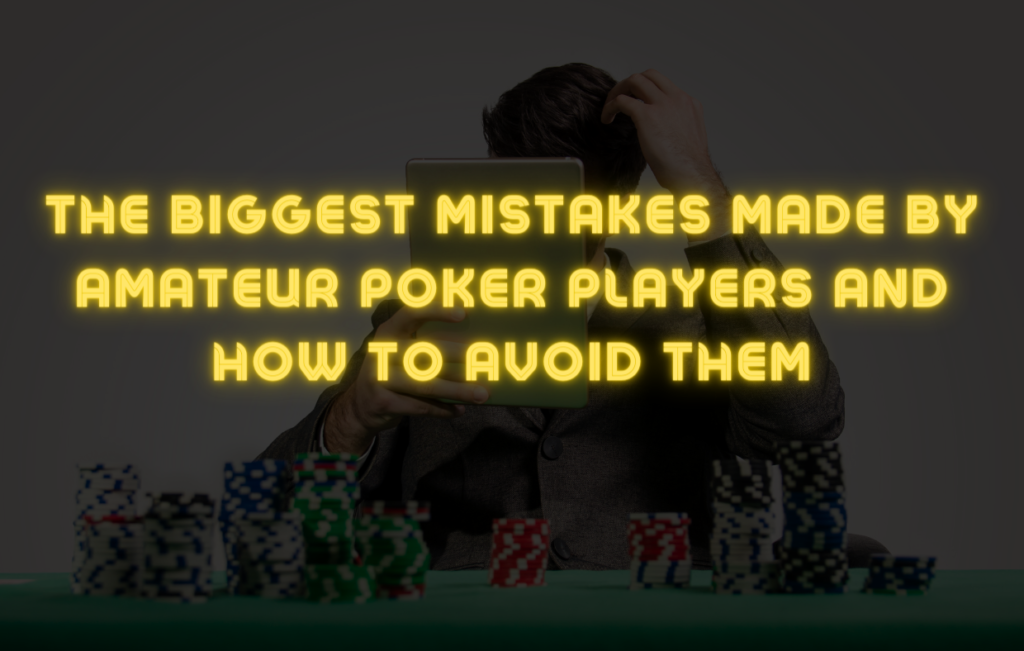
Poker, a game filled with nuance and strategy, can be daunting for newcomers. Many amateur players find themselves making common mistakes that can be easily avoided with the right knowledge and practices. This article will explore some of the most frequent errors made by novice poker players and provide actionable tips on how to sidestep these pitfalls, enhancing your overall game and increasing your chances of success at the poker table.
1. Playing Too Many Hands
The Mistake: Many beginners get caught up in the excitement of the game and play too many hands. They often think any two cards can win, leading to significant losses over time.
How to Avoid: Learning and sticking to the concept of hand selection is crucial. Focus on playing only the stronger hands in your starting position and adjust your play based on your table position and the action in front of you.
2. Ignoring Table Position
The Mistake: Novices frequently overlook the importance of position in poker. Playing the same hands regardless of position can lead to predictable and exploitable play.
How to Avoid: Understand the strengths of each position at the table. Use late positions to your advantage by observing the actions of your opponents before you must act, allowing for more informed decision-making.
3. Failing to Manage Bankroll
The Mistake: Poor bankroll management is a common issue where players risk too much of their total funds on a single game or play at stakes too high for their bankroll.
How to Avoid: Set aside a specific amount of money dedicated solely to poker—your bankroll. Only use a small percentage (typically 1-5%) of your bankroll for each session or tournament to mitigate risk and avoid going bust.
4. Overvaluing Hands
The Mistake: Beginners often overvalue their hands, especially suited cards or small pairs, which can lead to disappointment when these hands don’t improve post-flop.
How to Avoid: Gain a realistic understanding of which hands are likely to hold up and be cautious with hands that look good but often lead to losing pots. Learning hand strength in different scenarios is key.
5. Neglecting to Read Opponents
The Mistake: Amateurs frequently focus solely on their own cards and overlook their opponents’ potential hands.
How to Avoid: Develop the habit of observing your opponents’ behavior, betting patterns, and potential tells. This can provide crucial insights into their hand strength and help you make better decisions.
6. Letting Emotions Influence Play
The Mistake: Allowing emotions to dictate your actions, often referred to as ’tilt’, can derail your poker strategy and lead to significant losses.
How to Avoid: Maintain emotional neutrality. Recognize when you are tilting and take a break if necessary. Consistent practice in managing your emotional response helps in maintaining a clear head.
7. Inadequate Attention to Opponents’ Chips
The Mistake: Failing to monitor the size of your opponents’ chip stacks can result in missed opportunities or ill-advised bets.
How to Avoid: Always be aware of your own and your opponents’ chip counts. This information can influence your strategy, particularly in a tournament setting where chip stack sizes relative to the blinds are a crucial consideration.
8. Poor Bluffing Strategy
The Mistake: Ineffective bluffing or bluffing too often without a clear strategy or purpose.
How to Avoid: Bluff wisely by understanding when and against whom to bluff. Your bluff should tell a believable story and be used in the right situations to manipulate the perceptions of observant opponents.
9. Not Folding When Beaten
The Mistake: One of the hardest parts of poker is knowing when to fold. New players often hold on to hands too long, especially after making significant bets.
How to Avoid: Learn to identify situations where you are likely beaten and where further betting will only cost you chips. Folding in poker is not a sign of weakness but a strategic decision to save chips for more advantageous situations.
Understanding and avoiding these common mistakes can dramatically improve your gameplay and increase your profitability in poker. Remember, poker is a lifelong learning process, and each hand presents an opportunity to learn more about the intricacies of the game. By remaining disciplined, continuously adjusting your strategies, and learning from each session, you can develop into a formidable player at the poker table.
